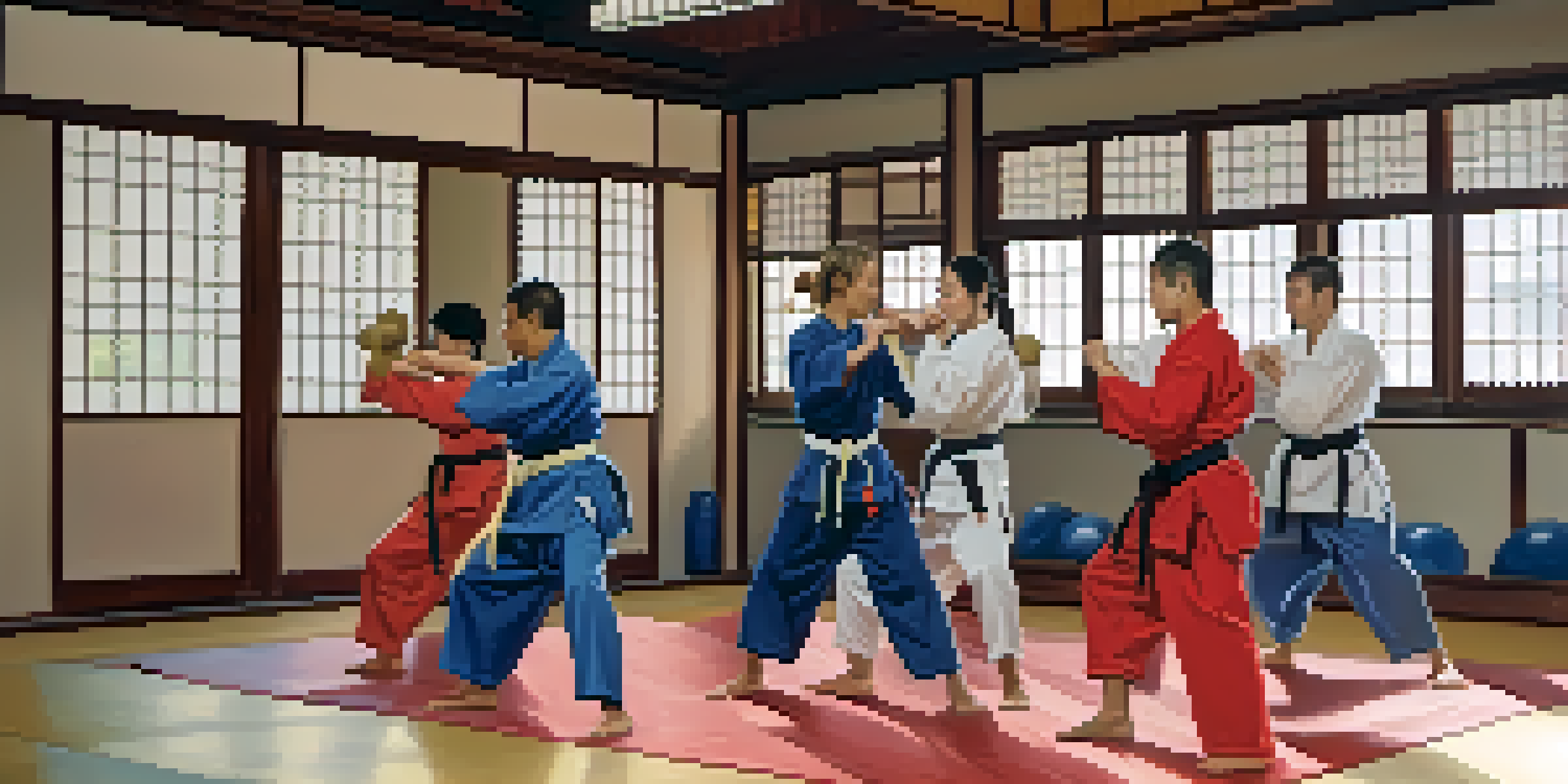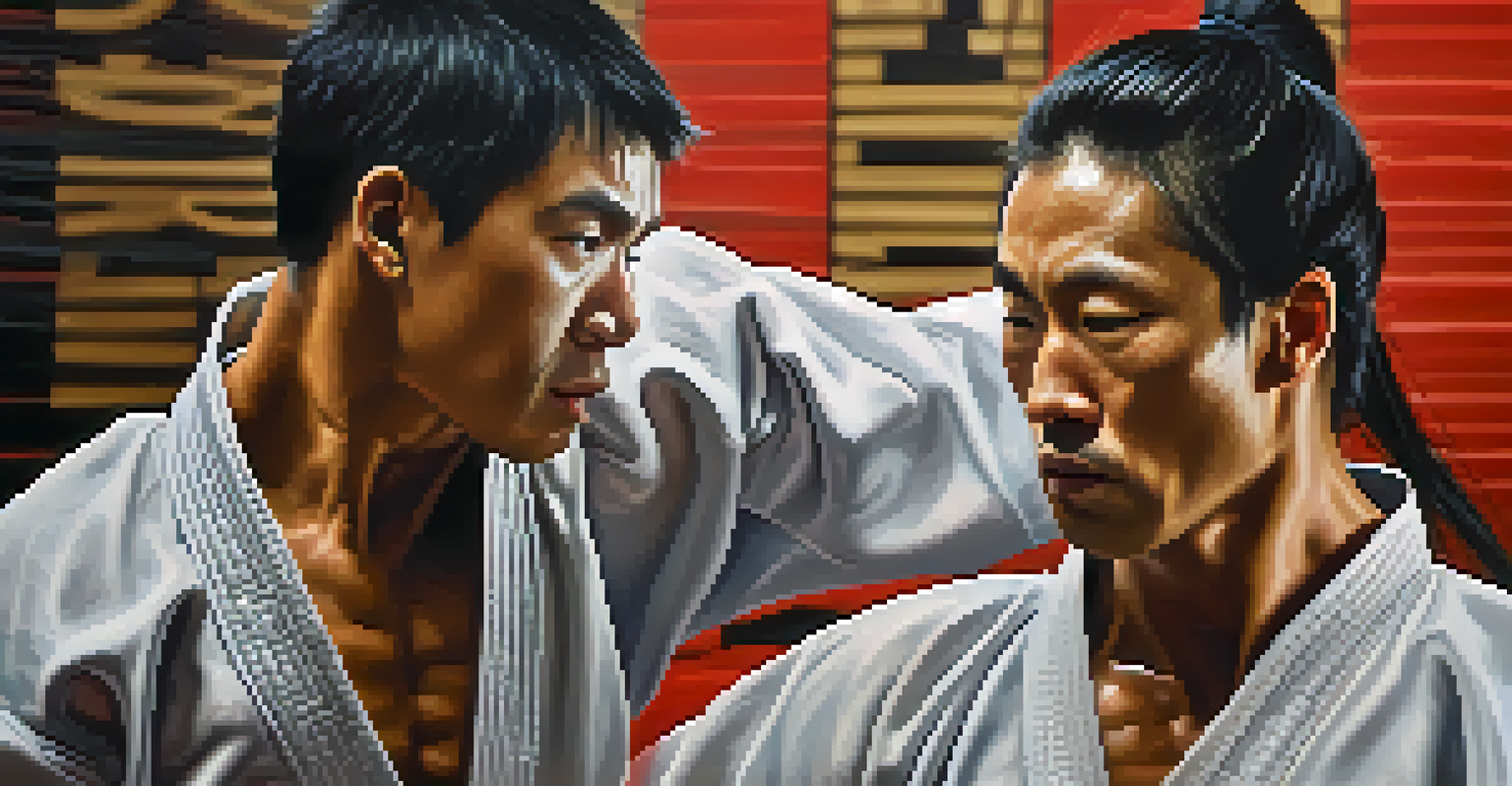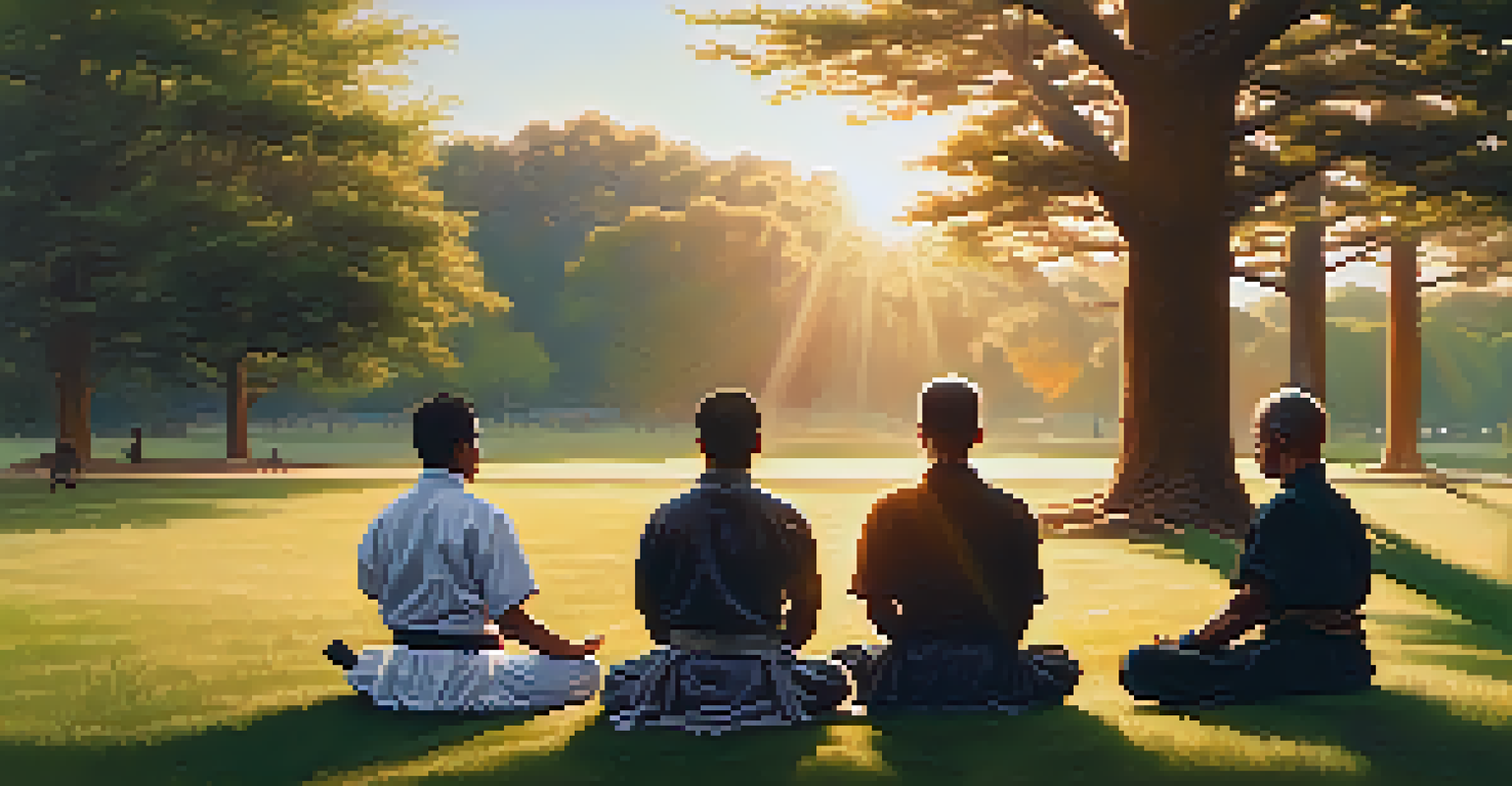Teamwork in Martial Arts: Enhancing Conflict Management Skills

Understanding the Role of Teamwork in Martial Arts
Teamwork is a foundational element in martial arts, often overlooked by those new to the discipline. In many martial arts forms, practitioners train together, supporting and challenging each other in equal measure. This collaborative approach not only builds physical skills but also nurtures mutual respect and understanding among team members.
The ultimate aim of martial arts is not having to use them.
When students work together, they learn to communicate effectively, whether it's through verbal instructions or non-verbal cues. This dynamic encourages trust, as members rely on each other to practice techniques safely and accurately. As a result, the dojo becomes a space where everyone contributes to each other's growth.
Moreover, teamwork in martial arts extends beyond the training mat. It instills a sense of community among practitioners, fostering friendships that can last a lifetime. These connections often lead to enhanced conflict management skills as individuals learn to navigate differences and resolve disputes in a constructive manner.
How Martial Arts Teaches Conflict Resolution
Martial arts is often perceived as a means of physical confrontation, but at its core, it emphasizes conflict resolution. Practitioners are taught to approach conflicts with a calm and collected mindset, focusing on de-escalation rather than aggression. This principle becomes ingrained through repetitive training and practical exercises.

During sparring sessions, for example, martial artists must assess their opponent's moves and respond appropriately without resorting to hostility. This practice encourages them to think strategically, promoting a mindset that's crucial for resolving conflicts outside the dojo. It’s about finding solutions collaboratively rather than simply overpowering an opponent.
Teamwork Builds Trust and Growth
Collaborative training in martial arts fosters trust and mutual respect, enhancing both individual and team performance.
Additionally, martial arts teaches mindfulness, which plays a significant role in conflict management. By learning to control their emotions and reactions, practitioners can approach disagreements with a level-headed perspective, making it easier to communicate effectively and reach mutually beneficial outcomes.
Building Trust and Communication through Training
Effective communication is at the heart of successful teamwork in martial arts. When practitioners train together, they engage in dialogues about techniques, strategies, and even feelings, fostering an environment where open communication thrives. This openness is essential for building trust, which is a critical component of conflict management.
Teamwork is the ability to work together toward a common vision. The ability to direct individual accomplishments toward organizational objectives. It is the fuel that allows common people to attain uncommon results.
Trust allows team members to be vulnerable, share their weaknesses, and seek help without fear of judgment. As martial artists practice together, they develop a deeper understanding of each other’s strengths and weaknesses, creating a supportive network that enhances their overall performance. This camaraderie translates into better conflict resolution skills, as individuals learn to rely on each other for support.
Moreover, the diverse backgrounds of practitioners often lead to rich discussions about different perspectives. This exposure helps martial artists appreciate and understand varying viewpoints, making them more adept at resolving conflicts in their personal and professional lives.
The Importance of Respect in Team Dynamics
Respect is a core value in martial arts that directly influences teamwork and conflict management. Each practitioner learns to honor their instructors, peers, and even adversaries, recognizing the unique contributions everyone brings to the table. This culture of respect creates a safe environment for collaboration and learning.
When respect is prioritized, conflicts can be addressed more constructively. Practitioners are more likely to engage in open discussions about issues, leading to solutions that benefit all parties involved. They learn to disagree without being disagreeable, which is vital in both martial arts and everyday life.
Conflict Resolution Through Calmness
Martial arts emphasizes approaching conflicts with a calm mindset, promoting strategic thinking and de-escalation.
Furthermore, this foundation of respect helps individuals manage their egos, allowing them to prioritize the team's success over personal glory. This selflessness is crucial for effective teamwork and helps mitigate conflicts that might arise from competitive tensions.
Applying Martial Arts Principles to Everyday Conflicts
The principles learned in martial arts are highly transferable to everyday life, especially when it comes to managing conflicts. For instance, the emphasis on calmness and strategic thinking during sparring can help individuals approach personal disagreements with the same level of composure. Instead of reacting impulsively, they can assess the situation and seek a peaceful resolution.
Moreover, the teamwork skills honed in the dojo can be applied to various group settings, whether in the workplace or community projects. Practitioners learn to collaborate effectively, listen actively, and support each other, which can transform the way conflicts are handled in team environments.
Ultimately, martial arts teaches that conflicts are not necessarily negative; they can be opportunities for growth and understanding. By embracing this mindset, individuals can navigate conflicts more effectively, leading to healthier relationships and a more harmonious community.
Overcoming Personal Challenges through Team Support
Many martial artists face personal challenges, whether physical, emotional, or psychological. The support system built through teamwork in martial arts plays a crucial role in helping individuals overcome these hurdles. When practitioners witness their peers facing difficulties and pushing through, it inspires them to do the same.
This shared journey not only fosters resilience but also cultivates empathy among team members. By understanding each other's struggles, practitioners can offer support and encouragement, creating a strong bond that enhances both personal and collective growth. This environment of support is instrumental in developing conflict management skills, as individuals learn to articulate their challenges and seek help when needed.
Respect Enhances Team Dynamics
Prioritizing respect in martial arts creates a supportive environment that facilitates constructive conflict management.
Additionally, working through personal challenges in a team setting prepares martial artists for future conflicts. They become adept at recognizing when to ask for assistance and how to provide support to others, reinforcing the idea that teamwork is essential not just in martial arts, but in all aspects of life.
Conclusion: The Lasting Impact of Teamwork in Martial Arts
The influence of teamwork in martial arts extends far beyond the training mat. Practitioners not only develop physical skills but also cultivate essential conflict management abilities that serve them throughout their lives. The lessons learned in the dojo—communication, respect, empathy, and strategic thinking—are invaluable tools for navigating the complexities of human interactions.
By fostering a culture of support and collaboration, martial arts creates an environment where individuals can thrive both personally and as a team. This collective growth prepares practitioners to face conflicts with confidence and poise, allowing them to transform challenges into opportunities for improvement.

In essence, the journey of a martial artist is as much about personal development as it is about mastering techniques. The teamwork that is cultivated through shared experiences not only enhances martial arts skills but also enriches life outside the dojo, leading to healthier relationships and stronger communities.